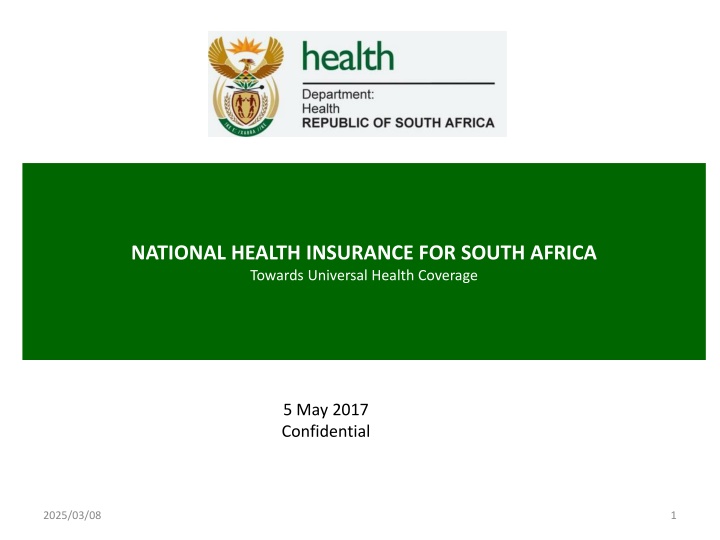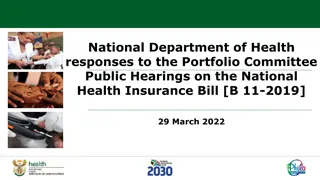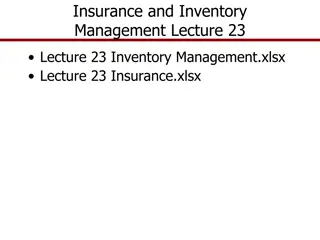NATIONAL HEALTH INSURANCE FOR SOUTH AFRICA
The National Department of Health in South Africa is proposing the final policy on National Health Insurance (NHI), aiming to transform the health system into a unified one to provide quality services for all based on health needs, regardless of socio-economic status. NHI is aligned with the constitutional commitment for access to health care services and reflects a society based on justice, fairness, and social solidarity. Implementation of NHI will lead to improved health outcomes and contribute to economic growth and social stability.
Uploaded on Mar 08, 2025 | 4 Views
Download Presentation

Please find below an Image/Link to download the presentation.
The content on the website is provided AS IS for your information and personal use only. It may not be sold, licensed, or shared on other websites without obtaining consent from the author.If you encounter any issues during the download, it is possible that the publisher has removed the file from their server.
You are allowed to download the files provided on this website for personal or commercial use, subject to the condition that they are used lawfully. All files are the property of their respective owners.
The content on the website is provided AS IS for your information and personal use only. It may not be sold, licensed, or shared on other websites without obtaining consent from the author.
E N D
Presentation Transcript
NATIONAL HEALTH INSURANCE FOR SOUTH AFRICA Towards Universal Health Coverage 5 May 2017 Confidential 2025/03/08 1
Introduction The National Department of Health proposes to publish the revised White Paper on National Health Insurance (NHI) as a final Policy on NHI. The finalisation and publication of the White Paper on NHI follows the publication on the 11 December 2015 of the draft White Paper on NHI and receipt of more than 160 written comments from various stakeholders. These comments were evaluated and considered when the draft White Paper was revised. The White Paper on NHI is aimed at providing a policy framework for transforming health system in the manner in which health care services are financed and purchased, as well as how these services are provided. NHI is aimed at transforming the fragmented two-tiered health system, the public and private, into a unified health system as envisaged by the 1997 White Paper on the Transformation of the Health System in South Africa 2025/03/08 2
WHAT IS NHI NHI is a health financing system seeks to provide access to quality health services for all South Africans based on their health needs and irrespective of their socio-economic status Represents a substantial policy shift that necessitate massive reorganisation of both public and private health sectors 2025/03/08 3
WHAT IS THE BASIS FOR NHI NHI is consistent with the Constitutional commitment for the state to take reasonable legislative and other measures, within its available resources, to achieve the progressive realisation of the right to have access to health care services including reproductive health care Implementation of NHI is a reflection of the kind of society we wish to live in: one based on the values of justice, fairness and social solidarity Implementation of NHI is consistent with the vision that health care should be seen as a social investment and not be subjected to market forces NHI will ensure a more responsive and accountable health system that is likely to improve user satisfaction, lead to a better quality of life of the citizens and improved health outcomes across all socioeconomic groups This will contribute towards improved human capital, labour productivity, economic growth, social stability and social cohesion. 2025/03/08 4
HOW WILL NHI TO TRANSFORMATION NHI will: Create unified health system by improving equity in financing, reducing fragmentation in funding pools, and by making health care delivery more affordable and accessible for the population; Eliminate out-of-pocket payments when the population needs to access health care services; Ensure that all South Africans have access to comprehensive quality health care services 2025/03/08 5
FEATURES OF NHI Universal access Mandatory prepayment of health care Comprehensive Services Financial risk protection Single fund Strategic purchaser Single-payer 2025/03/08 6
PRINCIPLES OF NHI The three dimensions of moving towards universal coverage i. ii. iii. iv. Right to access health care Social solidarity Equity Health care as a Public Good / Social Investment Affordability Efficiency Effectiveness Appropriateness v. vi. vii. viii. 2025/03/08 7
Population Coverage All South Africans and legal permanent residents entitled to healthcare services covered under NHI Every person in possession of the appropriate Unique Patient Identifier linked to the Department of Home Affairs' National Population Register, will have to register to secure NHI services and will be issued with an NHI Card Refugees will be covered in accordance with the Constitution of the Republic of South Africa, 1996 and other relevant legislations; Asylum seekers who have not been granted refugee status as defined in the Refugees Act, but are in possession of valid permits issued by the Department of Home Affairs, will access emergency health care services and services for notifiable conditions of public health concern; Excluded Temporary residents, foreign nationals (with and without visas), foreign students and tourists 2025/03/08 8
SERVICE COVERAGE Comprehensive package of personal health services Spectrum of community outreach, PHC level based on the ideal clinic model, health promotion and prevention to other levels of curative, specialised, rehabilitative and palliative care Provided through public and private providers Certified by OHSC Accredited by the NHI Fund Using clinical protocols and referral guidelines + Essential Drug List + Essential Laboratory List Point of entry = primary health care integrated teams of practices serve a catchment population with referrals to higher levels of care individual practitioners will have to be part of referral networks NHI Benefits Advisory Committee will develop and review evidence on cost-effectiveness, efficacy and health technology assessments therapies that have little impact on positive health outcomes will not be paid for under NHI 2025/03/08 9
COST COVERAGE No payments at the point of healthcare delivery Uniform Patient Fee Schedule will be abolished Fees at public sector hospitals will be levied to non-citizens, third-party payers such as medical schemes, In the early phases Road Accident Fund and COIDA (prior to their consolidation into the NHI Fund By-pass fees will be imposed for non-adherence to referral pathways Excluded services (e.g. elective cosmetic surgery), will be paid for in full by the patient 2025/03/08 10
ORGANISATION OF THE HEALTH CARE SYSTEM AND SERVICES UNDER NHI PHC Re-engineering Expansion of Municipal WBPHCOTs to each of 4,000 (plus) municipal wards Expansion of the ISHP and DCSTs Expansion of contracting private health care providers at non-specialist level Strategies to enhance effectiveness of the health care system Improving management and governance at PHC level greater management responsibilities to the district level Managers held accountable for their performance Clinic Committees advocacy role for the communities Establishment and strengthening of DHMOs management, planning and coordination of personal and non-personal health service provision taking into account purchaser provider split Health Promotion through the establishment of the National Health Commission 2025/03/08 11
ORGANISATION OF THE HEALTH CARE SYSTEM AND SERVICES UNDER NHI Hospitals and Specialised Services under NHI Central hospitals will be semi-autonomous funded through a transitional funding mechanism before NHI is fully functional Functional Business Units (FBUs) cost centres responsibility and accountability by Heads of Academic Departments governed by appropriately constituted Boards represent the interest of the users of the facility and affected stakeholders competence of the national sphere of government 2025/03/08 12
ORGANISATION OF THE HEALTH CARE SYSTEM AND SERVICES UNDER NHI (2) Establishment of the OHSC Implementation of National Quality Standards for Health Enhancing human resources for health Improving access to pharmaceuticals services Improving the efficiency of NHLS Improving access to EMS 2025/03/08 13
POOLING OF REVENUE THROUGH NHI FUND There will be reconfiguration of the institutions and organisations involved in the funding, pooling, purchasing and provision of health care services The NHI Fund will be a single national pool of funds that will be used to purchase personal health services on behalf of the entire population. Initially through Transitional Fund funding for central hospitals will be reconfigured into a central funding NHI will reduce fragmentation and to maximize income and risk cross- subsidisation Once fully implemented, NHI benefits will also include those social security services currently covered through: Compensation Fund for Occupational Diseases and Injury (COIDA); Compensation Commissioner for Occupational Diseases in Mines and Works Act (ODMWA); and the Road Accident Fund (RAF) i. ii. iii. iv. 2025/03/08 14
PURCHASING OF SERVICES i. There will be separation of institutional and organisational components that are responsible for the purchasing and provision of health services through a Purchaser-Provider Split Purchasing Function of the NHI Fund will be responsible for identifying population health needs and determining the most appropriate means to meet these needs The NHI Fund will leverage its monopsony power to strategically purchase services that will benefit the entire population entitled to benefit from NHI Providers will be contracted by the purchaser to deliver health services based on the need that has been identified Acting as a single-payer, the NHI Fund will be able to yield the efficiency benefits of economies of scale and ensure that incentive structures for health care providers are integrated and coherent. ii. iii. iv. 2025/03/08 15
CONTRACTING OF HEALTH SERVICE PROVIDERS 1) Providers who satisfy accreditation requirements will be considered for contracting with NHI based on need Contracting unit for the NHI district hospital linked to a number of PHC facilities; Later PHC facilities (Ideal Clinic model) Hospitals (will be afforded semi-autonomy) Contracts will contain a clear statement of performance expectations in respect of patient management; patient volumes; quality of services delivered; adherence to clinical protocols and treatment guidelines; and improved access to health services. Contracts will also stipulate the reimbursement strategy that will be applied Contracts will be reviewed on a regular basis taking into account health system priorities, epidemiological changes and provider performance. Performance will be monitored and appropriate sanctions will be applied where there is deviation NHI Fund in consultation with the Minister will determine its own pricing and reimbursement mechanisms 2025/03/08 2) 3) 4) 5) 6) 7) 16
PROVIDER PAYMENT MECHANISMS i. Through strategic purchasing, the Fund will reimburse contracted providers in a way that creates appropriate incentives for efficiency and for the provision of quality care Performance payments could be linked to reaching or exceeding certain targets Lump sum performance payments could also be made to individual staff and/or clinical and outreach teams The NHI Fund will use its various payment mechanisms to leverage the provision of efficient and quality services through linking provider payment to their performance and compliance with accreditation criteria At PHC, the main mechanism that will be a risk-adjusted capitation system with an element of performance based payment At the hospital level, the main mechanism that will be used to pay facilities contracted by the NHI Fund will be an activity-based payment such as diagnosis related groupers (DRGs) ii. 2025/03/08 17
HEALTH TECHNOLOGY ASSESSMENT HTA will inform: Prioritization Selection Distribution Management and introduction of interventions for health promotion, disease prevention, diagnosis, treatment and rehabilitation Will also be employed to: Promote efficient use of resources is a crucial factor for achieving a sustainable health system especially when significant increase in access to essential medicines, medical devices, procedures and other healthcare interventions are envisaged 2025/03/08 18
PROCUREMENT OF PHARMACEUTICALS AND GOODS i. Formulary listing the prices of medicines and health products will be established nationally ii. The selection of medicines and other health technologies will be based on burden of disease, efficacy, safety, quality, appropriateness and cost- effectiveness iii. Centralised function responsible for facilitating and coordinating all procurement of health-related products, including medicines, devices, equipment and other products iv. Pharmaceutical depots will no longer be a preferred method for ensuring the sustainable supply of medicines v. A mechanism of direct delivery of health commodities from suppliers to facilities shall be implemented 2025/03/08 19
END 2025/03/08 20























